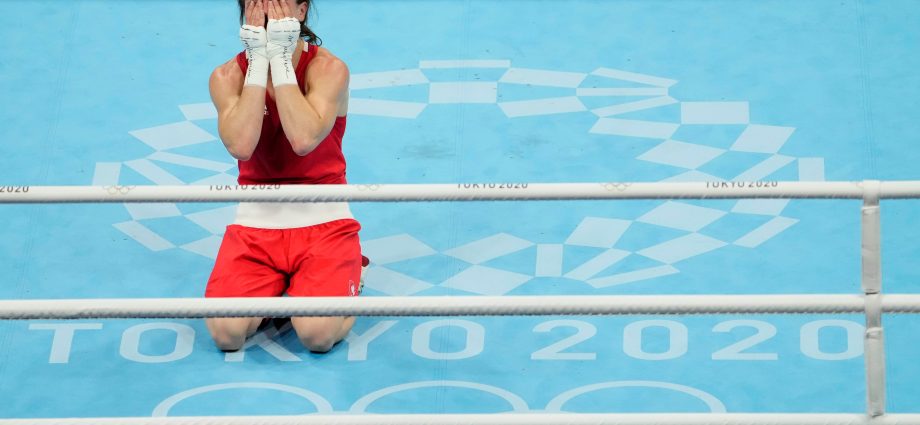Contents
The sensational victory of the Russian women’s gymnastics team pleased everyone who cheers for our athletes. What else surprised these games? We talk about the participants who inspired us.
The sports festival, postponed for a year due to the pandemic, takes place almost without spectators. Athletes lack the lively support of fans in the stands. Despite this, the girls from the Russian gymnastics team — Angelina Melnikova, Vladislava Urazova, Victoria Listunova and Lilia Akhaimova — managed to get around the Americans, whom sports commentators predicted victory in advance.
This is not the only triumph for women athletes at this extraordinary Olympics, and it is not the only event that can be considered historic for the world of women’s sports.
Which participants of the Tokyo Olympics gave us moments of joy and made us think?
1. 46-year-old gymnastics legend Oksana Chusovitina
We used to think that professional sports are for the young. Ageism (that is, age discrimination) is almost more developed there than anywhere else. But Oksana Chusovitina (Uzbekistan), a 46-year-old participant in the Tokyo Olympics, proved by her example that stereotypes can be broken here too.
Tokyo 2020 is the eighth Olympics in which the athlete competes. Her career began in Uzbekistan, and in 1992 at the Olympic Games in Barcelona, the team, where 17-year-old Oksana competed, won gold. Chusovitina predicted a bright future.
After the birth of her son, she returned to the big sport, and she had to move to Germany. Only there did her child have a chance to recover from leukemia. Torn between the hospital and the competition, Oksana showed her son an example of perseverance and focus on victory — first of all, victory over the disease. Subsequently, the athlete admitted that she considers the recovery of the boy to be her main reward.
Despite her «advanced» age for professional sports, Oksana Chusovitina continued to train and compete — under the flag of Germany, and then again from Uzbekistan. After the Olympics in Rio de Janeiro in 2016, she entered the Guinness Book of Records as the only gymnast in the world to have participated in seven Olympic Games.
Then she became the oldest participant — everyone expected Oksana to end her career after Rio. However, she again surprised everyone and was selected for participation in the current Games. Even when the Olympics were postponed for a year, Chusovitina did not give up her intention.
Unfortunately, officials deprived the champion of the right to carry the flag of her country at the opening of the Olympics — this was really offensive and demotivating for the athlete, who knew that these Games would be her last. The gymnast did not qualify for the final and announced the end of her sports career. Oksana’s story will inspire many: love for what you do is sometimes more important than age-related restrictions.
2. Olympic gold non-professional athlete
Are the Olympic Games just for professional athletes? Austrian cyclist Anna Kiesenhofer, who won gold in the women’s Olympic road group race, proved otherwise.
30-year-old Dr. Kiesenhofer (as she is called in scientific circles) is a mathematician who studied at the Technical University of Vienna, at Cambridge and at the Polytechnic of Catalonia. At the same time, Anna was engaged in triathlon and duathlon, participated in competitions. After an injury in 2014, she finally concentrated on cycling. Before the Olympics, she trained a lot alone, but was not considered a contender for medals.
Many of Anna’s rivals already had sports awards and were unlikely to take seriously the lonely representative of Austria, who, moreover, did not have a contract with a professional team. When Kiesenhofer on the descent at the very beginning went into the gap, it seems that they simply forgot about her. While the professionals focused their efforts on fighting each other, the math teacher was ahead by a wide margin.
The lack of radio communications — a prerequisite for the Olympic race — did not allow the rivals to assess the situation. And when the European champion, Dutch Annemiek van Vluten crossed the finish line, she threw up her hands, confident in her victory. But earlier, with a lead of 1 minute 15 seconds, Anna Kizenhofer had already finished. She won the gold medal by combining physical effort with precise strategic calculation.
3. «Costume revolution» of German gymnasts
Dictate the rules at the competition — the privilege of men? Harassment and violence in sports, alas, is not uncommon. The objectification of women (that is, looking at them exclusively as an object of sexual claims) is also facilitated by long-established clothing standards. In many types of women’s sports, it is required to perform in open swimsuits and similar suits, which, moreover, do not please the athletes themselves with the comfort.
However, many years have passed since the time when the rules were established. Not only fashion has changed, but global trends as well. And comfort in clothes, especially professional ones, is given more importance than its attractiveness.
Not surprisingly, female athletes are raising the issue of the uniform they are required to wear and demanding freedom of choice. At the Tokyo Olympics, a team of German gymnasts refused to perform with open legs and put on tights with ankle-length leggings. They were supported by many fans.
The same summer, women’s sportswear was raised by Norwegians at beach handboro competitions — instead of bikinis, women put on much more comfortable and less sexy shorts. In sports, it is important to evaluate the skill of a person, and not a half-naked figure, the athletes believe.
Has the ice broken, and patriarchal stereotypes in relation to women are changing? I would like to believe that this is so.










